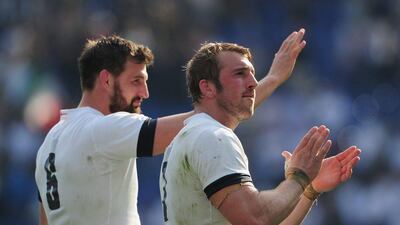Ireland deservedly won the Six Nations but it was World Cup hosts England who had arguably even greater cause for optimism looking ahead to the 2015 global jamboree.
The Irish gave retiring centre great Brian O’Driscoll a fairytale farewell with a dramatic 22-20 win against France in Paris on Saturday that saw them take the title in the final match of the Championship.
But it is not results against each other that will determine whether Europe’s finest can lift the World Cup but how they perform against the southern hemisphere giants of defending champions New Zealand, South Africa and Australia.
And it is here a youthful England side, who might have enjoyed a Grand Slam but for a frantic final five minutes during an opening defeat by France, could have the edge.
They, unlike their Home Nations rivals, know what it is to beat the All Blacks, and they will travel to New Zealand for a post-season tour buoyed by the emergence of a world-class second row pairing in Joe Launchbury and Courtney Lawes.
Meanwhile half-backs Owen Farrell and Danny Care were increasingly assured in a back division where full-back Mike Brown excelled in both attack and defence.
England, the lone European winners of the World Cup, can take heart from recalling that Clive Woodward’s global champions didn’t complete the Grand Slam until months before they triumphed at the 2003 edition.
In the end a 52-11 hammering of Italy in Rome wasn’t enough for England to snatch the title on points difference from Ireland and captain Chris Robshaw promised it would be a spur to better things.
“We made a vow to each other in Rome on Saturday that next year is going to be our year,” said the Harlequins flanker in the Daily Telegraph.
“We desperately want to take the next step in 2015 and win the Six Nations Championship.
“Then our sights will be set on the World Cup.”
Ireland have never got beyond the quarter-finals of a World Cup but that could change next year.
Their new coach, Joe Schmidt, won the Six Nations at his first attempt and the way in which they tactically overwhelmed two-time defending champions Wales 26-3 was a testament to the New Zealander’s astute planning.
The spine of the Ireland side looks sound, with full-back Rob Kearney, half-backs Jonathan Sexton and Conor Murray, back-row Peter O’Mahony and prop Cian Healy all impressing during this Six Nations.
O’Driscoll will leave big boots to fill but Ireland flanker Chris Henry said: “I think we have to capitalise on this now in terms of the World Cup.
“There’s no telling how far this team can go.”
For Wales, away losses to both Ireland and World Cup pool rivals England denied them the chance of a record third successive outright Six Nations title.
A lack of direction behind the scrum was a problem in both their defeats, with neither Rhys Priestland nor Dan Biggar convincing at fly-half.
Wales, who’ve suffered 18 straight losses at the hands of the southern hemisphere “big three” are now set to tour South Africa without both injured captain Sam Warburton and star full-back Leigh Halfpenny.
“The two games we lost, both teams kicked more than we did, particularly Ireland who played a lot of one-pass rugby and tried to negate a lot of our strengths,” said Wales coach Warren Gatland.
France, so often lacklustre, gave glimpses of class against England and Ireland with wing Yoann Huget impressive.
That suggested their enduring issue was the somewhat erratic team selection of coach Philippe Saint-Andre.
“Of course we can win the World Cup,” said Saint-Andre, whose predecessor Marc Lievremont guided France to an 8-7 defeat by hosts New Zealand in the 2011 final.
“We are a young team and working really hard to iron out some things that aren’t right but we are getting there.”
For bottom of the table Italy, who lost all five matches this Six Nations it was yet another gruelling tournament.
Scotland, last-minute winners over Italy, had an otherwise dire Six Nations, culminating in a record 51-3 defeat by Wales in Cardiff where full-back Stuart Hogg was sent off.
Follow us on Twitter @SprtNationalUAE

